
Launch of the Radio against Ebola initiative
Related project
Radio against Ebola
A CFI project in partnership with radio associations and federations in six West African countries
On 21-22 October 2014, CFI travelled to all six countries involved in the 'Radio against Ebola' initiative (Senegal, Mali, Ivory Coast, Burkina Faso, Togo and Benin) to meet representatives of the national committees responsible for fighting against the Ebola virus, doctors and anthropologists, NGO representatives, and also tribal leaders and religious dignitaries.
This two-day information session marked the start of two weeks of perfecting all the practical aspects involved in broadcasting radio programmes for raising awareness of Ebola and preventing the spread of the disease.
Radio against Ebola aims to train up journalists from 48 local radio stations in strategic geographical regions to come up with radio programmes for raising awareness of the Ebola virus and preventing it from spreading further, and also for encouraging changes in behaviour. The programmes, which will be broadcast in the local languages and dialects, will involve scientific, tribal and medical figureheads, and will supplement the communication initiatives already put in place by various bodies promoting increased awareness (such as local government authorities, MSF, Unicef and WHO).

During these two days, the journalists were able to get their knowledge of the subject up to speed and converse with the various players involved, so that they could gain a better understanding of the scientific, cultural and anthropological aspects of the disease.
This session marked the launch of the first phase of the project, which has been put in place with the help of the NGO SOLTHIS, and developed in partnership with the national federations of local radio stations in the six countries involved, namely URAC (Senegal), URTEL (Mali), URPCI (Ivory Coast), UNALFA (Burkina Faso), URATEL (Togo) and FERCAB (Benin).
The next phase, which is scheduled to start in November, will involve taking a select group of journalists and honing their skills as trainers for devising health-related programmes. Once they have returned to their respective countries, these journalists/trainers will then lead new training sessions, thereby giving as many radio stations as possible the chance to participate.
The final phase, which will involve training journalists to come up with a health-related magazine show, will be organised locally by the radio station federations and their local partners.
This training has told us everything we need to know about the issues surrounding Ebola, and has allowed us to reflect on what radio show formats are most effective for making the population more aware.
Said Salaou, Radio Junior FM, Man, Ivory Coast



